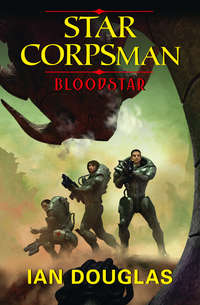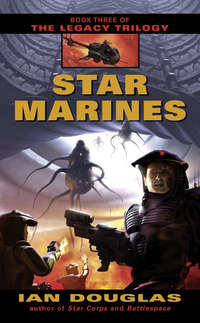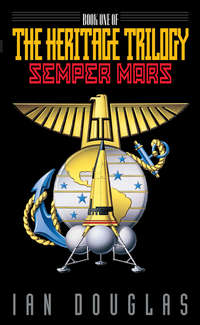
Полная версия
The Complete Inheritance Trilogy: Star Strike, Galactic Corps, Semper Human
What was important, however, was why, after a thousand years, individual and small-unit tactics were still of vital importance in combat. For centuries, virtual-sim generals had been predicting the end of the rifleman as the centerpiece of combat. The energies employed by even small-scale weapons were simply too deadly, too powerful, and too indiscriminate in their scope to permit something as vulnerable as a human being to survive more than seconds in a firefight.
Somehow, though, the venerable rifleman had survived, his technology advancing to extend his effectiveness and his chances of survival. The truth was, a planetary ground-assault unit like the 55th MARS could drop out of orbit, seize the starport, and hold it, where larger, faster, and more powerful AI-directed weaponry would simply have vaporized it.
Of course, by the time the Muzzies were through defending the port, most of it would be vaporized, wrecked, or otherwise rendered unusable anyway. That was the problem with war. It was so damned destructive … of personnel, of property, of entire cultures and societies. …
He completed setting up the KR-48 and keyed it to his helmet display. He switched on the weapon’s power shields, to keep it from being directly targeted by roving enemy combat drones or smart hunters, then bounded clear, making his way around the perimeter of the city plaza. Gunfire continued to crack and spit from the surrounding buildings, those that hadn’t been demolished yet, but the accuracy of the Marines’ orbital sniper fire seemed to be having a telling effect on the defenses. The instant a Marine came under fire, the attack was noted by Skyfire command and control, and the attacker would in moments be brought under counterfire, either by high-velocity rounds chucked from orbit, or from the A-90 ground-support aerospace craft now crisscrossing the skies above the port complex, or from other Marines on the ground linked into the combat net.
“Bravo one-one-five,” a voice whispered in his mind. His AI identified the speaker as Captain Baltis, his platoon commander, but he recognized the dry tones without his suit’s comm ID function. “Hostile gun position at six-one-three-Sierra. Can you neutralize it, Ram?”
He zoomed in on the indicated coordinates on his map window. The enemy fire was coming from the top of a forty-story structure two kilometers ahead. A drone feed showed the Muzzie gunners, clustered on a rooftop overlooking the plaza, clustered around a tripod-mounted high-velocity sliver gun.
“I’ll see what I can do,” Ramsey replied. “Why can’t we leave it to Sniper?”
“Because that would bring that whole tower down,” Baltis replied, “and we have civilians in there.”
Shit. The Muzzies didn’t seem to care whether their own civilians were caught in the line of fire or not. But the Marines were under standing orders to minimize collateral damage, and that meant civilian casualties.
“Okay. I’m on it.”
Rising, he bounded forward, covering the ground in long, low, gliding strides that carried him both toward the objective building and around toward the right. He was trying to take advantage of the cover provided by some smaller buildings between him and the target. As he drew closer, someone on the rooftop spotted him and swung the heavy-barreled weapon around to bear on him. He felt the snap of hivel rounds slashing through the air above his head, felt the impacts as they punched into the pavement nearby with bone-jarring hammerings and raised a dense cloud of powdered ferrocrete.
Dropping behind a plasteel wall, he connected with the KR-48 he’d left behind, using his suit’s link with the weapon to pivot and elevate the blunt snout toward the target building. On the window inset in his mind, he saw the KR-48’s crosshairs center over the top of the building; a mental command triggered a burst, sending a stream of thumb-sized missiles shrieking toward the rooftop gun emplacement.
The missiles vaporized chunks of cast stone, but the Muzzies’ armor damped out the blast effects. He’d been expecting it; he was using the weapon as a diversion, not for the kill.
Instantly, the Muzzie gunners swung their weapon back to the south, searching for the source of incoming fire. Ramsey watched the shift in their attention, and chose that moment to leap high into the air.
A mental command cut in his jump jets in midair, and he soared skyward, clearing the upper ramparts of the building, cutting the jets, and dropping onto a broad, open rooftop.
He used the flamer connected to his left wrist to spew liquid fire into the gun emplacement. The enemy troops were shielded against tactical heat, of course, but the suddenness of his appearance, arcing down out of the sky, surprised and startled them, and the torch blast melted the plastic mountings of the hivel gun and toppled it over onto its side.
Shifting his aim, he torched the floor of the rooftop enclosure, cutting open a gaping crater. Two of the Muzzie infantrymen were caught in the collapse of the roof, falling through in a shower of flaming debris; Ramsey shifted to the mag-pulse rifle mounted on his right arm and hammered away at five more Theocrat soldiers who were busily crowding back and away from his landing point.
One of the hostiles managed to open fire with a sliver gun at Ramsey, and the Marine felt the hammer of high-speed rounds thudding into his chest and helmet armor, but he held his ground and completed his targeting sweep with the pulse rifle, watching the barrage smash through enemy armor like a rapid-fire pile driver, shredding, rending, turning titanium laminate carballoy into bloody scrap.
The last of the hostiles collapsed on the blazing rooftop, or toppled through the gaping hole in front of them. The entire engagement had taken perhaps three seconds.
“Bravo one, Bravo one-one-five,” he reported. “Target neutralized.”
“Good deal,” Baltis replied. “Now get your ass forward! You’re behind sched!”
“On my way.”
Another leap, and he sailed off the burning building’s upper story, using his jump jets to brake his fall.
His suit AI was flagging another gun position just ahead. …
USMC Recruit Training Center
Noctis Labyrinthus, Mars
0720/24:20 local time, 1738 hrs GMT
“Fall in! Fall in!”
Panting hard, Garroway stumbled up to the yellow line painted on the pavement. The run, which Warhurst had lightly declared to be a shake-down cruise, had lasted two hours and, according to his implant, had covered nearly 14 kilometers. A number of the recruits hadn’t made it; at least, they’d not kept up with the main body. Presumably, they were still straggling along out in the desert someplace, unless Warhurst had sent a transport out to pick them up.
Garroway had assumed that the meager third-G of Mars’ surface gravity would make calisthenics—no, PT, in the Marine vernacular—easy. He’d been wrong. Gods, he’d been wrong. The run across the rugged highlands of the Noctis Labyrinthus had left him at the trembling edge of collapse. His skinsuit, newly grown for him when he’d checked in at the Arean Ring receiving station, was saturated with sweat, the weave of microtubules straining to absorb the moisture and chemicals now pouring from his body. His leg muscles were aching, his lungs burning. He’d thought the implants he’d purchased two weeks ago would have handled the extra stress.
This was not going to be easy.
The worst of it was, Gunnery Sergeant Warhurst had accompanied them on that run, and so far as Garroway could tell, the guy wasn’t breathing hard, hadn’t even broken a sweat. His uniform was still crisp, the flat-brimmed “Smokey Bear” hat of ancient Corps tradition still precisely squared above those hard, cold eyes.
“Okay, children,” he said, planting his hands on his hips. “Now that we’ve warmed up a bit, it’s time we got down to work. Hit the deck, push-up position! And one! And two! …”
By now, the sun was up, though much of the run had been through the foggy, pre-dawn darkness. Mars was a tangle of mismatched terrain, rendered both beautiful and twisted by the centuries of terraforming. The sky was a hard, deep, almost violet-blue, the sun shrunken and cold compared to back home. The ground was mostly sand, though patches of gene-tailored mosses and coldleaf added startling accents of green and blue. The run had brought them in a broad circle back to Marine RTC Noctis Labyrinthus, a lonely huddle of domes and quick-grown habs in a rocky desert. East, the tortured terrain of the Vallis Marineris glowed banded red and orange beneath the morning sun, and open water gleamed where the Mariner Sea had so far taken hold.
Damn it, he couldn’t breathe. …
“Come on, kiddies!” Warhurst shouted. “You can give me more than that! There’s plenty of oh-two in the air! Suck it down!”
What sadist, Garroway wondered, had decided that this was where Marine recruits would come to train? Centuries ago, of course, RTC had been on Earth … at a place called Camp Pendleton, and at another place called Camp Lejeune. Those places were no more, of course. The Xul Apocalypse had wrecked both bases, when tidal waves from the oceanic asteroid strikes had come smashing ashore. For a time, Marines had been trained on Luna, and then at one of the new LaGrange orbital bases, but almost two centuries ago, with the completion of the Arean Ring, the Corps had transferred much of its training command to Mars. The first recruits on the surface at Noctis Labyrinthus, Garroway had heard, had done their PT wearing coldsuits and oxygen masks. He was beginning to think someone had jumped the gun in deciding to forego the support technology.
“Okay! Okay! On your feet!” Warhurst clapped his hands. “How are we doing, kids? Eyes bright? Hearts pumping? Good! We have a very special treat in store for you now.” He pointed. “See that building? Fall in, single file, in front of that door! Move it! Move it!”
The platoon scrambled to obey, running fifty meters across the ’crete pavement and lining up outside the door. A sign beside the doorframe read sickbay.
That puzzled Garroway. They’d pumped him full of medinano at the receiving station, enough, he’d thought, to kill everything in his system that wasn’t nailed down. He’d already had several thorough physicals, back on Earth Ring, and in Mars orbit. What were they going to …
Realization hit him just as Warhurst began addressing the formation.
“This, children, is where we separate the real men and women from the sheep. You were all informed that this would be part of your recruit training, and you all agreed when you thumbed your enlistment contract. However … if any of you, for any reason, feel you cannot go through with this, you will fall out and line up over there.” He pointed across the grinder at one of the assistant DIs, who was standing in front of a transport skimmer. “You will be returned to the receiving station, and there you may make arrangements for going home. No one will think the less of you. You will simply have proven what everybody knows—that the Marine Corps is not for everyone. Do I have any takers?”
Again, Garroway thought he felt some of the recruits in line around him wavering. The terror was almost palpable.
“If you file through that door,” Warhurst continued, a tone of warning giving his edge a voice, “you will be given a shot of decoupling nano. It won’t hurt … not physically, at any rate. But after the shot takes effect, you will be unable to access your personal cerebral implants. Right now, each of you needs to think about what that means, and decide if being a Marine is worth the cost.”
The decoupler shot. Yeah, they’d told him about it, but he’d already known about it, of course. It was one of the things that set the Marines and a few other highly specialized elite military units apart from the Army, Navy, or the High Guard. Wonderingly, Garroway looked down at his right hand, catching the glint of gold and silver wires imbedded in the skin at the base of his thumb and running in rectilinear patterns across his palm.
He was going to lose his implants.
The vast majority of humans had cereblink implants, including palm interface hardware, quantum-phase neurocircuitry, and a complex mesh of Micronics grown layer by layer throughout the brain, especially in the cerebral sulci and around the hypothalamus. The first nano injections generally were given to the fetus while it was still in womb or in vitro, so that the initial base linkages could begin chelating out within the cerebral cortex before birth. Further injections were given to children in stages, at birth, when they were about two standard years old, and again when they were three. By the time they were four, they already possessed the hardware to let them palm-interface with a bewildering variety of computers, input feeds, e-pedias, and machines. Most basic education came in the form of electronic downloads fed directly into the student’s cerebral hardware. Adults depended utterly on hardware links for everything from flying skimmers to paying bills to experiencing the news to opening doors to talking to friends more than a few meters distant. The cereblink was one of the absolutely basic elements of modern society, the ultimate piece of technology that allowed humans to interface with their world, and interact with their tools.
And now, the recruits of Company 4102 were about to lose that technology and, for the first time in their lives, would face the world without it.
The thought was terrifying.
“Okay, recruits! First five in line! Through the hatch, on the double!”
The first five recruits stumbled up the steps as the door cycled open for them and vanished into the building. Garroway watched them go.
He thought about quitting.
This was the one part of recruit training that he’d wondered about, wondered whether or not he could make it through. Oh, he knew he would survive, certainly. Millions did, and most went on to be U.S. Marines. And if he could get through these next few weeks, his old hardware would be reconnected and he would get new implants as well. Marines were hardwired with internal gadgetry and high-tech enhancements that most civilians didn’t even know existed.
But the thought of being cut off like that …
Many of the humans now living on Earth, he understood, were pre-tech … meaning they went through their lives, from birth to grave, as completely organic beings. No technological chelates cradling their brains and brain stems, no nanocircuitry growing through their neural pathways.
No EM telepathy, so no way to talk to those around you unless you were actually in their presence or you happened to have a portable comm unit with you. No translator software; if your friend didn’t happen to speak your language, you were out of luck. No e-conferencing in noumenal or virtual space. No e-Net linking you with every other person and every electronic service across the Solar System.
No way to access news, or weather—assuming you were on Earth which actually had weather—or med access, or epedia information feeds, or travel directions, or life journals, or any of the hundreds of other data downloads necessary in today’s fast-paced life.
No sims. No download entertainment. No way to interact with either the stored or broadcast simvids that let you take the role of hero or villain or both.
No way to buy the most basic necessities. Or to find them, since most shops now were on-line.
No driving ground cars, piloting mag skimmers, or accessing public transit.
No books, unless you could find the old-fashioned printed variety … and that was assuming you could read them. No more educational feeds … and no access to personal e-memory. Gods, how was he going to remember anything? …
And there was Aide. For Garroway, that felt like the worst … losing access to Aide, the AI mentor, secretary, and personal electronic assistant he’d had since he was a kid.
Without his hardware, the world was suddenly going to be a much smaller, much more difficult, much narrower place … and knowing that he would survive that narrowing did not make the prospect any more bearable.
Cut off from technological civilization, from society, from everything that made life worth the living. …
“I know it seems extreme, kids,” Warhurst said, using a telepathic feed to whisper inside their minds. “You feel like we’re cutting you off from the universe. In boot camp we call it the empty time.”
Garroway wondered whether the DIs had some secret means of accessing their implants and hearing their thoughts … or if he just knew and understood what the recruits would be thinking now. Probably the latter. It was against the law to sneak into another’s private thoughts and eavesdrop, wasn’t it?
“The thing is,” Warhurst went on, “there will be times as a Marine when you won’t have the Net to rely on. Imagine if you’re on a combat drop and something goes wrong. You end up a thousand kilometers behind enemy lines. You don’t have the local Net access codes. Worse, if you try to link in, the local authorities will spot you. Somehow, you have to survive without the Net until you can make contact with your sibling Marines.
“Or maybe you just have to go into a hot DZ on a planet with no Net at all, and there’s a screw-up and the battlefleet Net isn’t up and running for, oh, a standard day or two or ten. Believe me, it happens. What can go wrong will go wrong. What are you going to do then?
“The answer, of course, is that you will be Marines, and you will act like Marines. You will be able to draw upon your own resources, your training, your experience, and you will survive. More than survive, you will kick ass and emerge victorious, because victory is the tradition of the Corps!”
Garroway felt a little better after Warhurst’s speech. Not good … but better. He gave a mental click to increase neural serotonin levels and help lift his mood. Hell, that was another thing he’d be missing in the next few weeks—the ability to alter his own emotional state as necessary. He felt a tiny, sharp stab of fear, and instantly suppressed it.
How did Marines control the fear if they didn’t have access to neural monitoring software or the ability to deliberately tailor their emotional state? Or were the wild stories true, stories to the effect that Marine combat feeds eliminated fear and boosted such emotions as rage and hatred for the enemy? He’d always assumed those tales were nonsense, the product of civilian ignorance. Still …
“If you children want to be Marines,” Warhurst’s whisper continued, “we have to know who and what you are. How you react under stress. We need to know your character. And we need to take you, all of you, down to your most basic, most elementary level and build you up, one painful layer at a time. At the end of these sixteen weeks, you will not be the men and women you were. You will be Marines … if you make it through.”
It made sense, of course, what Warhurst was saying. Boot camp always had required an initial breaking down, so that the drill instructors could mold recruits into Marines. And there were other factors besides … like cutting the recruits off from outside sources of information so that they were utterly dependent on their instructors. Like taking away anything that would distract them from the grueling physical and intellectual training ahead.
Like getting them to rely upon themselves.
“Believe me,” Warhurst added, and Garroway swore he could hear a grin in the man’s inner voice, “for the next few weeks you children won’t need your tech-toys, and you’ll be way too busy to miss ‘em! Besides, you’ll have me to tell you what you need to know! Next five in line! Through the hatch!”
Garroway thought one last time about quitting, and shoved the thought aside.
“Don’t worry, Aiden,” his inner AI whispered in his mind. “I’ll be back. You’ll see.”
Together with four other recruits, he bounded up the steps and into the unknown.
3
0407.1102
Green 1, 1-1 Bravo
Meneh, Alighan
0824/38:22 hours, local time
“Okay, Marines. How are we going to do this?”
Ramsey considered the question. Staff Sergeant Thea Howell rarely asked for advice. When she did, the problem was certain to be a certified bitch.
With the vantage point of the gods, he looked down on the city. In the noumenon, the imaginal inner space of his mind’s eye, he was hovering above the city center and starport as if from a giant’s towering perspective. Physically, in fact, he was crouched in what had been a basement, shielded from view by several tons of rubble, and the closest Marine to his current position was nearly five hundred meters away, but he was only distantly aware of any of that. His cereblink and the fleet’s SkyNet, however, allowed them to share a noumenal conference space, complete with tiny red icons marking the position of each known Muzzie soldier, gun, and vehicle, green for Marines, white for civilians or unknowns.
The tacsit was clear enough. Theocrat riflemen had holed up in another skyscraper, an eighty-three-floor tower at the edge of the central plaza, and they’d turned the place into a fortress, with portable rocket launchers and at least one light plasma cannon. Life scans had revealed a heavy concentration of civilians in the smaller buildings clustered about the tower’s base; smash the tower with close-air ground support or orbital fire, and several hundred civilians would die.
So rather than standing off and bombing the Theocrats, the Marines would have to do this the old-fashioned away, with a direct CQB assault.
And it was going to get damned messy.
“From the top down,” Ramsey said after a moment, answering Howell’s question. Under his control, green lines of light flicked across the imaginal landscape, taking advantage of available cover, then vaulting into the sky to converge on the tower roof from four directions. “Has to be. Otherwise we fight our way up that tower one floor at a time.”
“Agreed,” Howell said. “But that rooftop is over 250 meters straight up. Too far for jumpjets.”
“Then we’ll need to ride Specter guns,” Sergeant Chu pointed out. “And we’ll need to move straight up and fast.”
“Roger that,” Corporal Ran Allison said. “Looks like a lucky two-fiver.”
The slang referred to twenty-five percent casualties … if they were lucky. It was a grim and chillingly sobering assessment.
“Ten of us,” Howell said, noting the green icons surrounding the tower, a kilometer distant. The icons flashed, one after another, as she ran through the names. “Me, Beck, and Santiago on one. Hearst and Daley on two. Rodriguez and Gertz on three. Ramsey, Allison, and Chu on four. Coordinate on me. I’ve put the call out, and our rides will be here in two mikes. Everyone get set.”
Ramsey dropped out of the noumenal link and began shouldering upward through the layer of debris above him, his combat suit’s paramusculature allowing him to move aside several tons of debris as he climbed. Heaving aside a 3-meter chunk of ferrocrete, he emerged again into the smoke-stained light of the Alighan morning.
The pace of the battle had slowed considerably, now that the defenders had been reduced to a few isolated pockets of resistance scattered across a ruined city. In less than the promised two minutes, a Specter gun hissed overhead, an awkward-looking fragment of one of the landing vehicles that had brought the Marines down to the planet’s surface hours before. Piloted by an independent AI, kept aloft by agrav pods and protected by a ball-turret plasma gun, the flier looked like a black insect, complete with gangly, slender legs equipped with powerful grapples. Reaching up, he grabbed hold of one of those legs and locked on; the jointed member retracted partially, pulling him clear of the wreckage and into the air.









